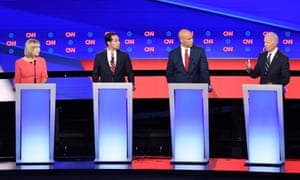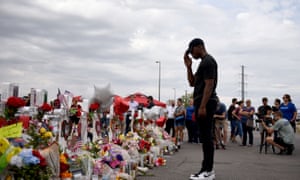US elections 2020
Even before the recent spate of mass shootings, candidates touted comprehensive plans for stricter gun laws

Photograph: Jim Watson/AFP/Getty Images
John Kerry went pheasant hunting in Iowa weeks before the 2004 presidential election. Hillary Clinton spoke fondly of learning to shoot as a little girl during the 2008 Democratic primaries. And facing his own re-election in 2012, Barack Obama responded to a question about the Aurora movie theatre massacre by primarily suggesting the US government better enforce existing gun laws.
For years, Democrats wary of turning off the pro-gun rights wing of the American electorate approached presidential elections with a reticence to engage on the politically divisive issue of gun control.
But today, as the US reels from another spate of mass shootings, the days of tiptoeing around the nation’s gun laws are long gone.
The sprawling 2020 Democratic field is not only eager to talk about America’s gun violence epidemic. Candidates are touting comprehensive plans to impose stricter gun laws – putting the issue squarely at the center of the party’s agenda going into the presidential contest.
“They’re out-muscling each other to see who can have the most aggressive platform and that’s quite a shift from prior presidential cycles when candidates felt like they had to inoculate themselves with the NRA by establishing their bona fides as hunters and shooters,” said John Feinblatt, the president of the anti-gun violence group Everytown for Gun Safety.
“I think it’s fair to say that the myth that this is the third rail is buried once and for all.”

For several candidates, the policy rollouts on guns predated the recent massacres in El Paso, Texas, and Dayton, Ohio.
The New Jersey senator Cory Booker unveiled a 14-part plan in May that his campaign dubbed “the most sweeping gun violence prevention proposal ever advanced by a presidential candidate”. Booker’s plan would require all gun owners to obtain a license through the federal government, impose new restrictions on bulk gun purchases, limit purchases to one handgun a month and subject gun manufacturers to meet more stringent federal safety standards.
Senator Kamala Harris vowed a series of executive actions in April, which included mandatory background checks on customers of any dealer who sells more than five guns a year and tighter regulation of gun manufacturers and licensing. She also put forward a plan that would ban the importation of AR-15-style assault weapons to the US and seek to close a loophole that paves the way for some domestic abusers to purchase firearms.
Nearly all of the Democratic presidential contenders have said they support an assault weapons ban and universal background checks. Several have embraced a voluntary gun buyback program, under which individuals could turn in their firearms to federal agencies in exchange for some form of compensation.
In the wake of the twin shootings over the weekend, the former vice-president Joe Biden, the Vermont senator Bernie Sanders and the former Texas congressman Beto O’Rourke all came out in favor of national buyback programs for assault weapons.
And the South Bend mayor, Pete Buttigieg, rolled out a plan on Tuesday that would establish a national gun licensing system and is the first to dedicate a section to the threat of white nationalism, promising a $1bn investment toward combating and preventing extremism and radicalization.
“I don’t remember a time when, this early on in the electoral process, you saw the presidential candidates prioritize gun reform,” said Igor Volsky, the executive director of Guns Down America and author of the book Guns Down: How to Defeat the NRA and Build a Safer Future with Fewer Guns.
“They’re doing that now and they’re doing it in the boldest language they’ve used in about 20 to 25 years.”
Polling has consistently shown that a majority of Americans support some form of new gun laws, such as expanding background checks and banning high-capacity magazines. The US Congress has nonetheless been marred by inaction amid opposition to new gun laws from Republicans in Congress.
The last time lawmakers in Washington debated the issue in earnest was in the aftermath of the 2012 Sandy Hook elementary school massacre in Newtown, Connecticut, which claimed the lives of 20 children, aged six and seven, and six educators.
Despite an aggressive push for stricter gun laws by the Obama administration, a Republican-led filibuster blocked the advancement legislation that would have expanded universal background checks.

Obama spent much of his second term decrying congressional inaction, plainly stating that the US was “the only developed country on earth” where school shootings were routine. The former president signed 23 executive actions aimed at reducing gun violence – some of which Donald Trump reversed upon taking office.
In a sign of the shifting political climate, Clinton also took aim squarely at the NRA during the 2016 campaign and identified gun violence as a top priority. During the Democratic primaries, she repeatedly criticized Sanders’ record on guns and championed measures that included rolling back legal immunity for the gun industry.
From the anti-gun violence movement’s vantage point, the often testy sparring between Clinton and Sanders over guns foreshadowed how the issue was steadily gaining prominence with each election cycle.
“Eight years ago, we could barely get liberal Democrats interested in gun safety after Gabby Giffords – one of their own colleagues – was almost assassinated,” said Mark Glaze, a longtime gun control advocate, in reference to the 2011 mass shooting in Tucson, Arizona.
“Today gun violence prevention is a litmus test for Democrats up and down the ballot and it’s important for Republicans in swing districts. That’s a big change in a very short time.”
Source: Elections - theguardian.com



